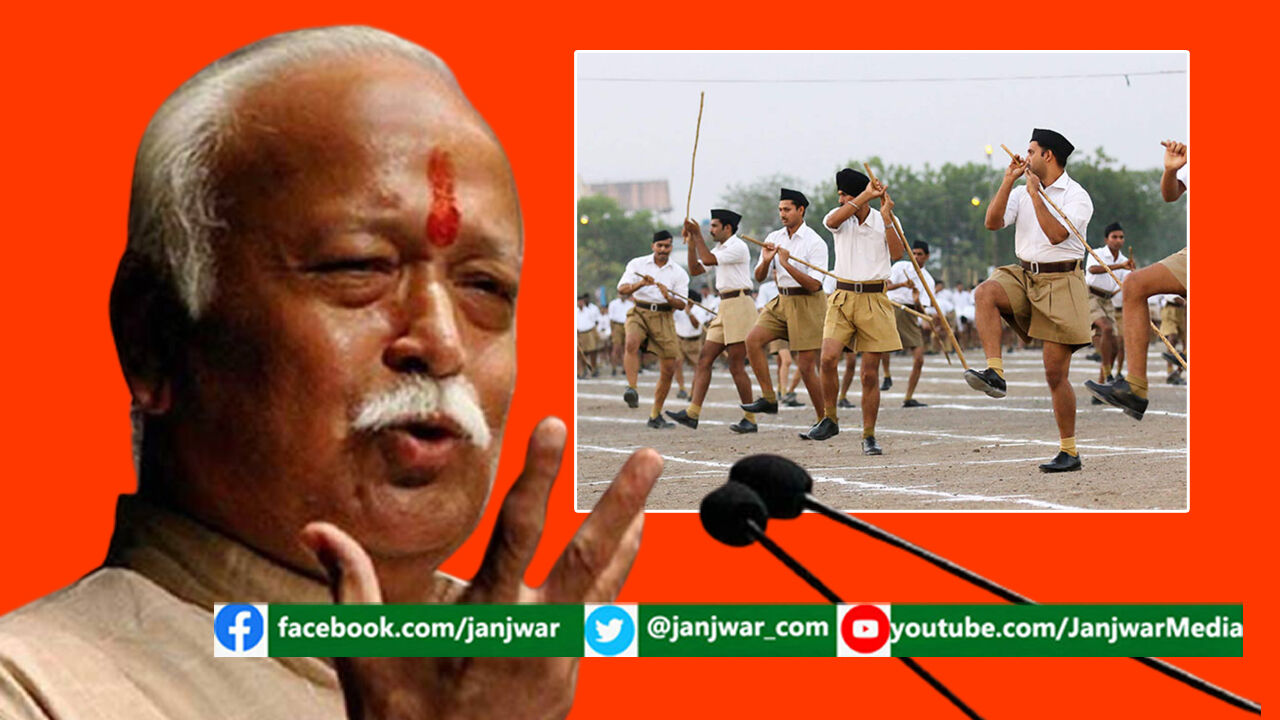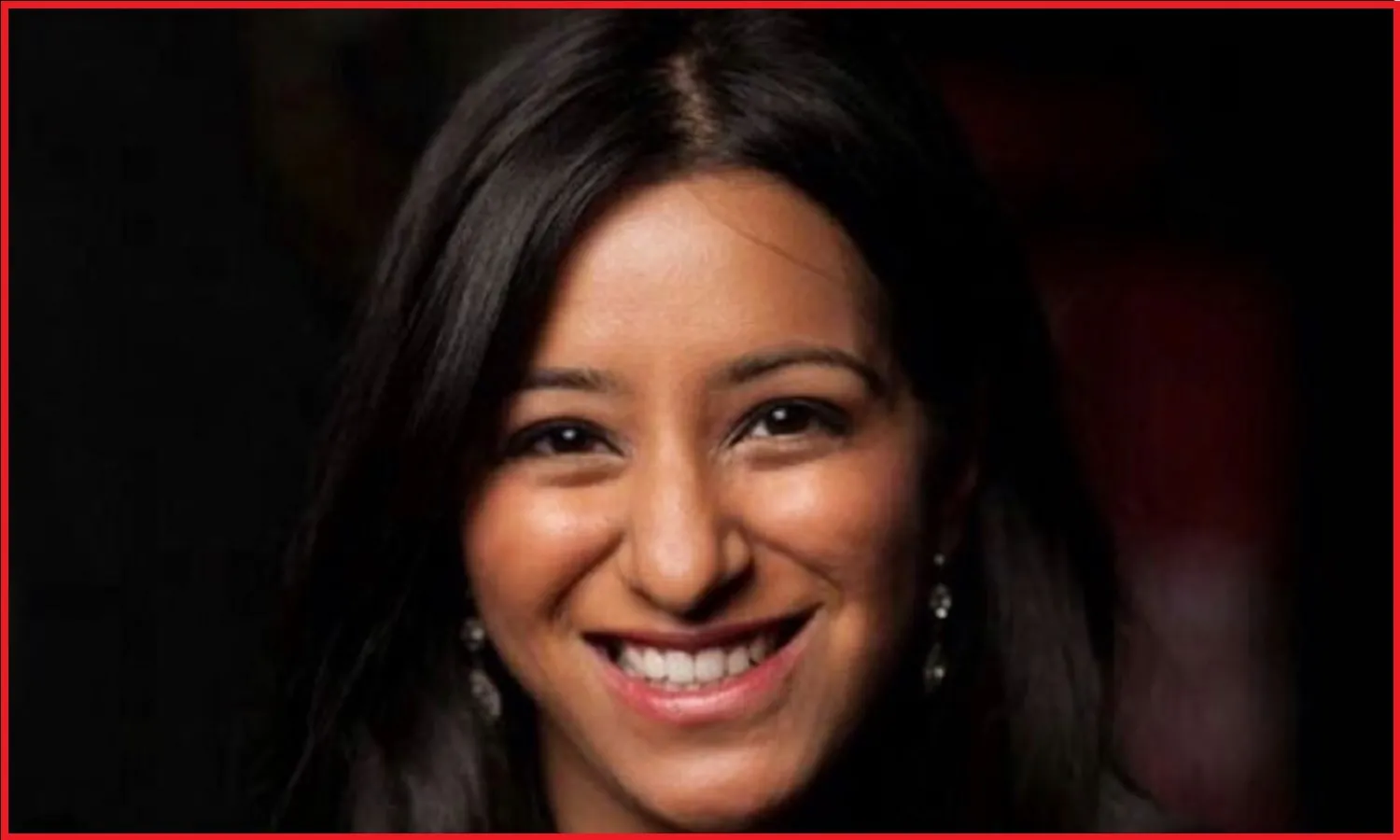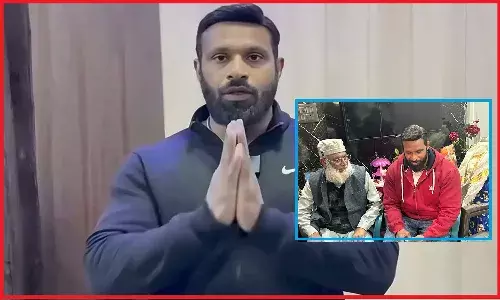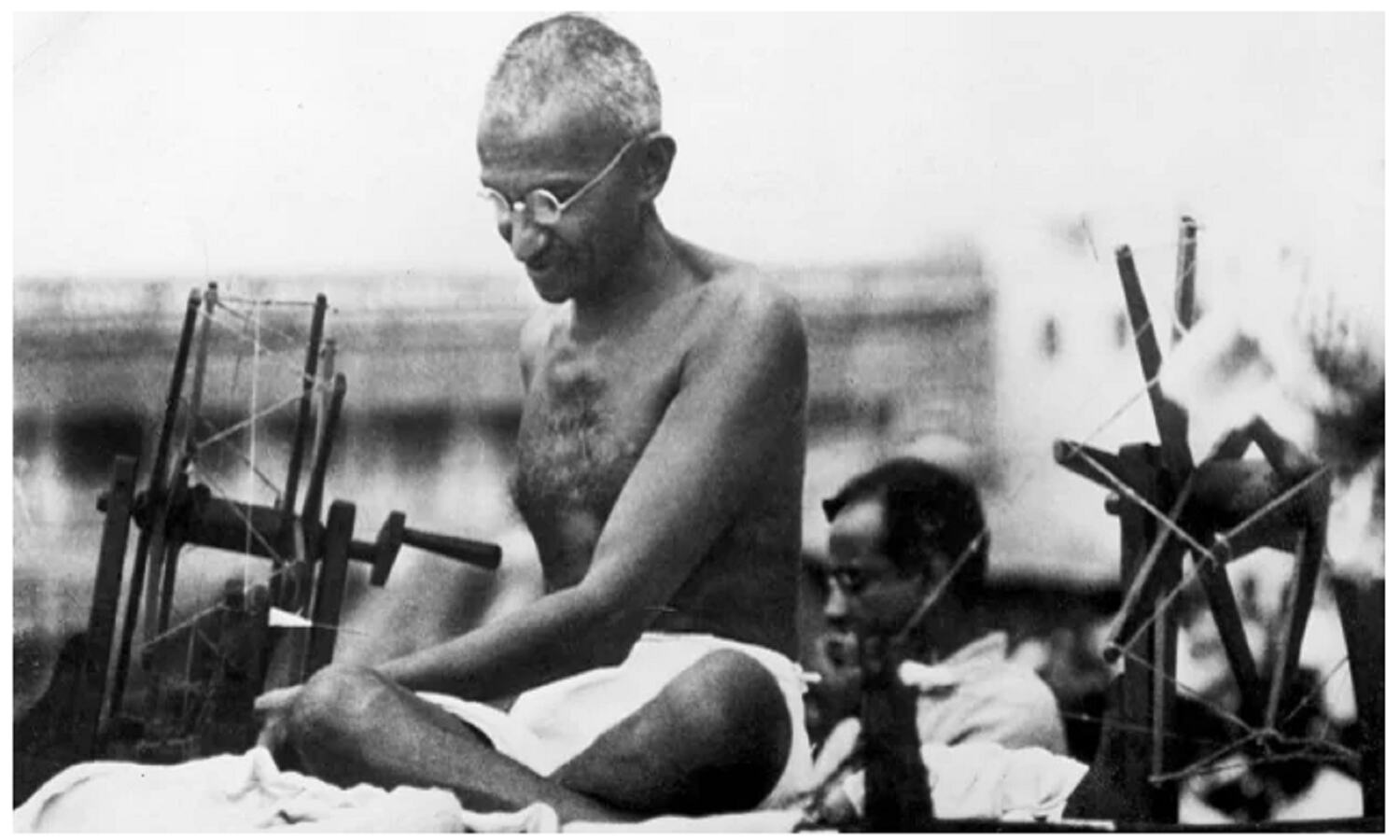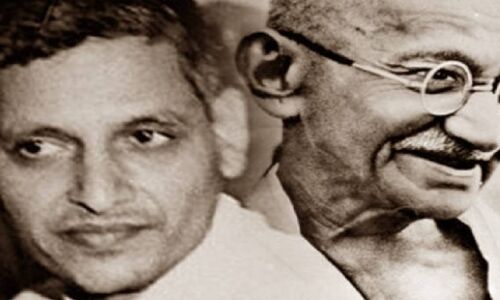Lockdown forced lawyers in Bihar's Gaya to sell vegetables and masks
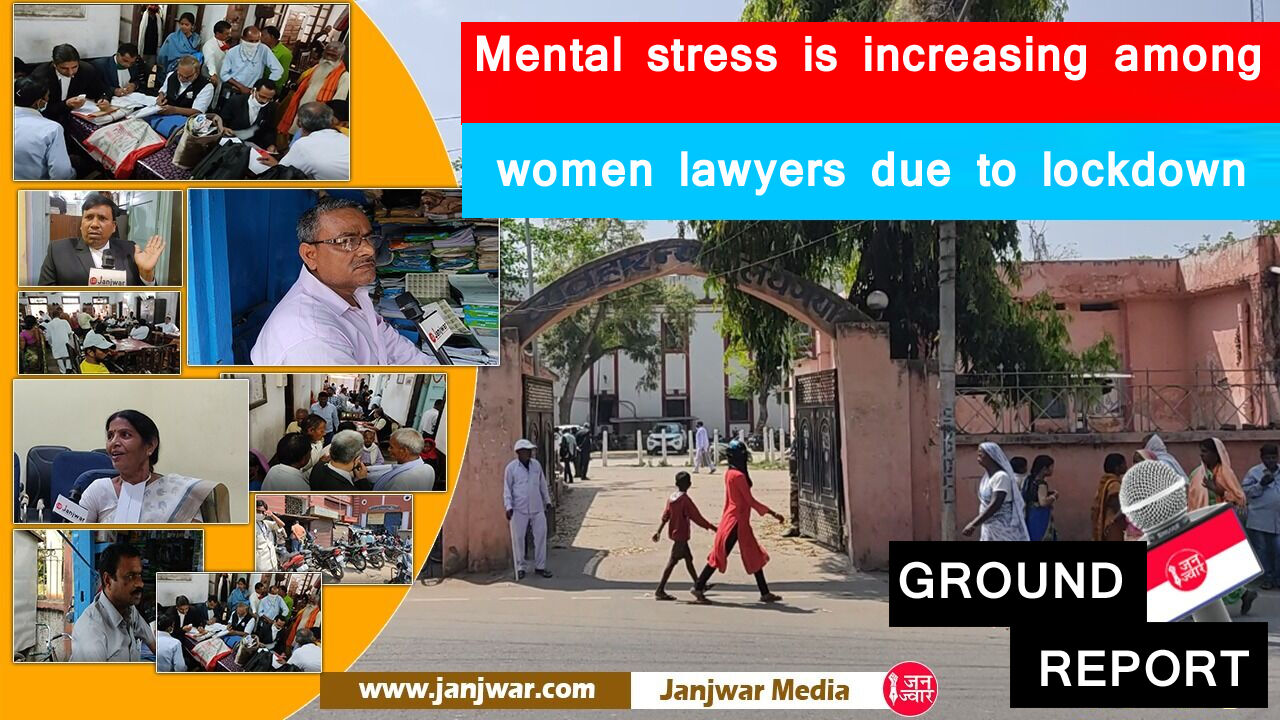
First phase lockdown brought legal profession under pressure, second lockdown will completely destroy it !
Special report by Salman Arshad from Gaya
Janjwar. "Though the sudden declaration of lockdown due to Covid-19 had adversely affected the whole country, the people associated with the legal profession were the worst hit" said President of Gaya Bar Association Shri Om Prakash way back in early April when Corona seemed to be on the decline .
But now in most states, lockdown has been partially or fully reimposed due to fast increasing cases of Corona and the resultant number of deaths. Now the condition of people in legal fraternity has further deteriorated. Not only lower level lawyers and Munshies are having tough time but those lawyers are also suffering who used to have normal practice.
Munshi Gopal Prasad had taken a loan with 4 percent monthly interest for the treatment of his ailing wife. Says he," If the current slow pace of working in the lower court continues, it will take 5 years for him to repay the loan."
Since the lockdown has again been imposed, the situation has turned pretty bad. So it's obvious that the condition of people like Munshi Prasad must have turned very bad.
There are innumerable such stories of pain and sorrow. These stories are mostly untold but when you happen to come close to such people, their anguish, pain and sorrow is all written on their faces.
Gaya is the second largest district of Bihar. It is also an ancient town which finds a place in epics like Ramayan and Mahabharat. As per 2011 census, the total population of Gaya is 4,391,418. At the district level, lawyers have two Unions and the combined registered number of lawyers is 3,500. Out of this 150 are women lawyers. The number of OBC and Dalit lawyers is not known.
(Lifting of lockdown last time had generated hope among legal professionals, increasing crowd within Gaya Court premises was a witness to it !)
The secretary of the Union says, "Data on the basis of caste is not kept in the Union." But a lawyer, on the condition of not revealing his name, told that the number of backward and dalit lawyers in the district is around 400. Janjwar didn't come across any other lawyer who could support this claim. Though on record, the number of women lawyers is 150 but in reality only 30 women lawyers come regularly to the court. Similarly out of 1500 clerks or munshies, only half are currently coming to the court.
But way back in the first week of April, the court was bustling with life, people jostling each other. In such a situation it was very difficult to maintain physical distancing.Putting mask is just a formality. No one wears it properly. Advocate Rajesh Kumar says,"It is not possible to wear a mask in the prevailing atmosphere at the court premises and it is no longer useful now.When mask is not being used in political rallies and movements then why are ordinary people being forced to wear it ? " Though, of course. Rajesh Kumar did not allow his statement to be recorded.
Advocate Lalit Kumar Gupta also vents out his anger by saying that lockdown is meant for ordinary people only while political rallies and elections are being held flouting the Covid-19 protocol openly.
In nutshell, at the Gaya court premises nobody seems to be following the Covid-19 protocol nor does the atmosphere look conducive for it. Be it lawyers, their clerks or shopkeepers, all of them want that lockdown should be fully done away with so that legal processes start functioning properly and those earning their bread and butter through this profession could resume their work regularly.
The Plight of clerks or munshies of lawyers
No doubt, lockdown had more or less affected all but the lawyers'clerks or munshies were the worst hit. They were almost pushed to the verge of hunger. The earnings of the clerks are dependent on the income of the clients. On the instructions of lawyers, munshies get the work from clients and also receive payment for the work. But there is no fixed rate for the work done and it depends on the deal struck between the lawyer and his client.
Siince very little work was being done in the lower court, the visits of the clients were also stopped resulting in zero income to the munshies. Clerk Akhilesh Kumar Sharma says,"The lockdown had a very bad impact on us. The clerks didn't get any help from the government or any other organisation. Of course, Gaya Bar Association did extend a helping hand by providing food and other essentials."
While talking to the clerks, the biggest problem we faced was their reluctance to speak in front of the camera. Off camera clerk Akhilesh Kumar Sharma says," Almost every clerk in this court is heavily indebted. This debt has been taken on interest from a money lender or some known person but in the name of self-respect, no one is ready to speak about it.
Working as munshi since 1983, Gopal Prasad admits that he took a loan at 4 percent interest rate to meet the economic crisis created by the lockdown. He was forced to take the loan at such a high interest rate in order to meet the medical expenditure of his ailing wife. The number of such clerks who took high-interest loans to meet the economic challenges thrown by the lockdown is very high.
One such clerk says," Lockdown affected labourers and farmers were given relief (though small) by the government but we did not get any relief from anywhere."
Condition of shopkeepers in Court's premises
Though customers have now started visiting shops in the court premises, shopkeeper Mukesh Kumar says that earnings are still less than half of what it used to be before the lockdown. He is also afraid of the possibility of a second lockdown. Pappu Kumar runs a three-generation old tea shop in the court premises. Still he had to take a loan to face the economic crisis generated by the lockdown. He borrowed money from his friends as well as took a loan on interest from the market. Despite all this, he also had to drive a battery rickshaw to keep the kitchen fire burning. Pappu Kumar says that if lockdown happens again then many people will have to commit suicide.
Lakshman Prasad Agarwal runs a stationary shop in the court premises. He told Janjwar that he could survive the lockdown because of his savings, help from neighbors in the area and provision stores giving food grains and other essential items on credit. But Lakshman Prasad is also afraid of lockdown getting repeated again because now he no longer has enough savings to meet the financial crisis.
Impact on the earnings of lawyers
While talking to lawyers it was felt by Janjwar that they were reluctant to reveal their income during the pandemic though some of them did admit that during lockdown they were the worst hit.
The President of the Bar Association advocate Om Prakash and its General Secretary Murari Kumar Himanshu say that this lockdown has fully destroyed the lawyers and their clerks.
Advocate Dr.Brijesh Chandra Mishra shows his anger by saying that lockdown was unnecessary and has resulted in pushing lawyers away from the people and fully destroying them.
During informal talks, many lawyers told us that due to lockdown a large number of lawyers were forced to sell vegetables or masks or pursue some other work. Though the Bar Association's president Advocate Om Prakash denies it. He says that Gaya Bar Association did provide help to the lawyers who were economically weak.
Murari Kumar Himanshu says,"There are around 800 such lawyers in the Association whose financial condition is very bad. Of course, many well-off lawyers also suffered heavy economic losses during lockdown."
The condition of new entrants
Advocate Anil Kumar says that during lockdown around 20 percent lawyers quit the profession and adopted other means of livelihood.
Bar Council General Secretary Himanshu counts around 200 lawyers who did not come to the work after the lockdown was lifted. But he also adds that they are doing case related work from home. He also reveals that around 20 junior lawyers have changed their profession and are now selling masks, vegetables,fruits etc. while some are working in shops and even left the city to work somewhere else concealing their identity. At the same time Himanshu hopes that they will come back and resume their work once normal situation prevails in the court premises.
Talking to Janjwar advocate Ejaz Haidar and others also raised the issue of giving a minimum of 5000 rupees as monthly stipend for 5 years to the new entrants in the legal profession so that they can establish themselves in the profession. Most of the lawyers quitting their profession and returning to their native villages were these new entrants only. In fact there are very few lawyers who can be kept in the category of well-off lawyers. Going by what lawyers said, these well to do lawyers were least affected by the lockdown. More than 80 percent lawyers depend on day-to-day earnings and it is they who were affected adversely by the lockdown.
In Gaya, lawyers got two types of assistance. Firstly, the Bar Council gave 2000 rupees as one time financial assistance to those lawyers who had applied for it. Secondly, Gaya Bar Council, on its own, also provided assistance to its members but this amount was also very small (1000 to 2000 rupees) and was given to a select few.
Advocate Akhilendra Kumar is of the view that at least lawyers should be linked to the Ayushman Yojna because lawyers can not work when they are sick or are facing pandemic-like situations.
According to the General Secretary of Gaya Bar Association, 18 lawyers died during the lockdown, of which 4 were suffering from Corona and the rest were mentally upset due to the lockdown.
Says Murari Kumar Himanshu,"Some of those who died were financially so weak that their family members had no money to perform their last rites. So the Bar Association came forward to help them financially."
The president of Gaya Bar Association advocate Om Prakash said," A proposal to provide financial aid by the government to the new entrants has been sent to the government but seeing the current economic situation in the country and the way the current government is working, it doesn't seem that the proposal will be given any attention.
The condition of women lawyers
According to the General Secretary of Gaya Bar Council , around 150 women lawyers are practising in this court. Out of these only 30 women lawyers are regulars.
Very few women lawyers are seen in the court. Of these,three women lawyers talked to the Janjwar team but only two of them came before the camera. When we tried to talk to more women lawyers, they simply refused to talk to us.
Practising law for the last 20 years, advocate Shashikala Devi says,"During lockdown, lawyers faced a lot of problems but it was more troublesome for women lawyers because they have to run kitchens also. No doubt, Indian women are blessed with special power due to which they somehow manage to feed their families but in the process they also have to suffer a lot."
When asked why there are so few women lawyers in Gaya, Shashikala said,"You men hardly allow them to go out for work. Now the way girls are getting opportunities for higher studies, the number of women lawyers is going to increase in future." Another lawyer Lalita Singh says that she had no idea that lockdown would stretch so long. Due to the lockdown our income has been so badly affected that we have forgotten that besides rice and dal ,vegetables also used to be a part of our daily meals.
The status of online hearings
About online hearings advocate Anil Kumar says,"All lawyers are not in a position to be able to participate in online hearings. The lawyers are neither technically strong nor do they have enough resources to participate in it."
Another lawyer says that there are hardly 10 percent of lawyers who are capable of participating in online hearings. In order to make online hearings easy, it is necessary to train lawyers in technical faculty. The President of the Gaya Bar Association says,"A large portion of lawyers could not properly participate in online hearings, but those lawyers had no difficulty who were either technically sound or could hire experts. But very few senior lawyers fall in this category."
On the other hand, advocate Sahdev Yadav says," The basic structure of online hearings is itself not capable of making hearing easy and smooth. What is meant here by basic structure is the speed of the network and availability of resources like computers and laptops."
The problems of clients
Advocate Akhilendra Kumar says," Due to lockdown many procedural difficulties had come up because of which the victims could not get justice on time. Because of such difficulties many cases of bail hearings could not be decided on time with the result that clients had to stay longer in prison."
Advocate Dr. Brijesh Chandra Mishra says that in civil cases judgements are not delivered till 20 years. In such cases, if decisions are not taken on time then it can be well imagined how painful it could become for the clients.
According to advocate Lalit Kumar Gupta there are more than 10 such cases where accused are in jail because the hearing did not take place on time.
Many lawyers and clerks say that when lockdown generated procedural difficulties are not resolved yet then judges should take into consideration this aspect of the problem rather than cancelling the bail applications of the accused.
Crimes during lockdown
On the question whether the crimes increased or decreased during lockdown, the lawyers had mixed reactions. Advocate Akhilendra Prasad says that crimes were reduced because people were confined to their homes, they had no freedom to move out. But others feel that the land grabbing cases did increase during the lockdown. But advocate Akhilendra Kumar does not agree with this argument. He says that cases of land dispute were there before the lockdown, did happen during lockdown and are also happening today.
But there are some who blame lockdown for the increase in crime graphs. He says that lockdown caused widespread unemployment with the result that people having no resources for income turned to the world of crime. Advocate Lalit Kumar Gupta says that since hearings on civil matters were stopped, land grabbing and resultant crimes have increased during the lockdown. Gaya Bar Association President advocate Om Prakash does agree with him.
Domestic violence during lockdown
Advocates Akhilendra Kumar and Anil Kumar Sharma feel that the domestic violence did not increase during the lockdown but on the contrary, the love has increased among the family members because family members got more time to spend with each other. But woman lawyer Shashlata Devi doesn't agree. Says she," The condition of women is very bad in India and particularly in Bihar. Domestic violence against women is very common and it increased during the lockdown." When asked how domestic violence can be stopped, she replies," Women will have to become economically independent, only then domestic violence against them can be stopped. But senior lawyer Lalita Singh considers domestic violence as a social problem and says that women have always been subjected to domestic violence but do not talk about it openly for the sake of family honour.
Thus it is very much clear that every face in the court premises reflects a poignant story written by the stormy spell of Lockdown.
( This report is part of a project supported by Thakur Family Foundation. The Foundation has not exercised any editorial control over the project. )







